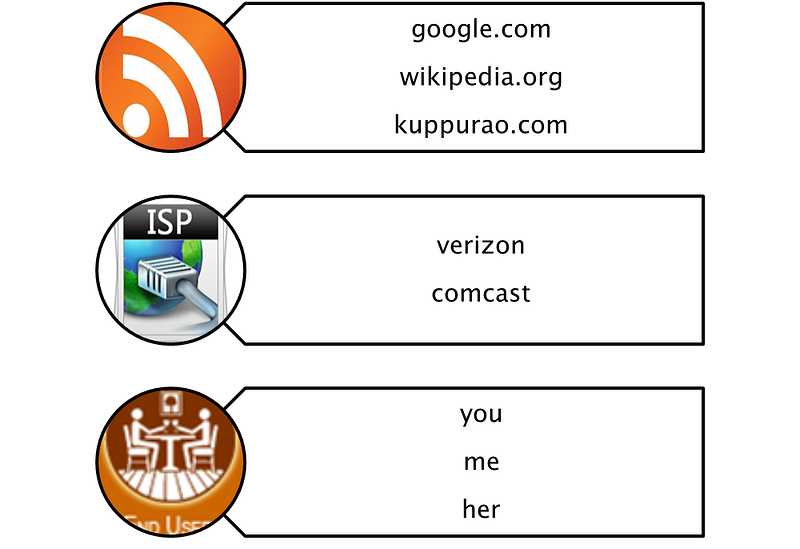Net Neutrality — What is the true cost?
I have written several times about Net Neutrality. You can read my prior articles here, here and here. During the process of writing and afterwards, I have asked myself “What could be a valid anti-net-neutrality argument?”. I then figured, the better question to ask might be “What is the true cost of net neutrality?”
At a very fundamental level, there are 3 entities that I will refer to in this discussion. They are the content providers, transport/ service providers, end users (below).
For the sake of simplicity, I will classify this issue into two parts –
(a) “A squirrel dying in your front yard more important than people dying in Africa” — Zuckerberg
Service providers and content providers, in the name of personalization and customization, alter the user experience based on the user’s prior browsing preferences and publicly available information about the person. While this issue is significantly threatening, the impact is mostly qualitative, at least from an end-user standpoint. Consider Zuckerberg’s statement for a moment — if the Facebooks and Googles of the world are successful in doing this, it means two things (i) they have invaded your privacy (ii) they have successfully created a bubble for you to live in, obscuring your view of the rest of the world. As I pointed out, the end-user impact is significant mostly qualitative.
(b) Metered Internet
Thanks to some crazy investments done during the dotcom boom — we had implemented adequate infrastructure for several years of expansion of internet, without the burden of cost on anyone. But with social, cloud and mobile computing, bandwidth is — once again — becoming scarce. Service providers are trying to stretch the dollar and when that’s not enough, “get creative” about additional sources of revenue, including un-neutral ways of providing internet access and internet content.
The only reason favoring un-neutral internet that I have come across is profits. If Comcast (for example) is not able to make their ends meet (or improve their bottomline), they should increase how much they charge the end user every month. Instead of paying $50 for internet, we might be paying $75 a month — that still wont be nearly as bad as letting Comcast tell you what websites you can visit or how many times you can visit Facebook in a month. The pro-NN view is that it is okay if I am charged based on how much I have consumed, but not based on what I have consumed. The providers get the revenues in any case — but between the two lies a sea of difference in terms of where this internet is heading — particularly in an information-enabled era.
